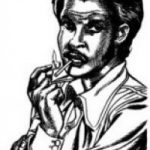Sooner or later, I knew I had to deal with Michel Foucault. Not only is his name pretty much synonymous with the study of the history of sexuality, he was a practicing perv himself. So, with trepidation, I checked “The History of Sexuality, Vol. 1” and read it.
I’m a concrete thinker: I understand prefer examples to abstractions. Foucault writes at such high level of abstraction, it sounds impressive, almost poetic, but I have a hard time applying it to any real world example. It’s almost Hermetic, an intellectual model so seductively attractive that it may have little or nothing to do with the real world. This is precisely the kind of thing I want to avoid in this book, but if you study the history of sexuality you inevitably bump up against this kind of rarefied, critical theory language.
Not to say there aren’t interesting ideas here. Foucault says that we need to junk the repressive hypothesis of the late 20th century, that the 19th century was an era of censorship and sexual repression. Instead, the modern age (i.e. the last few centuries of the West) is a flourishing of sexual discourse. Foucault uses Diderot’s story of “The Indiscreet Jewels,” an Orientalist fable about a sultan’s magic ring that makes women’s genitals talk about their experiences. The starting point for all this was the Catholic pastoral, manuals for taking confession that advised going into great detail about the act. Sex had to be said. In this view, Walter, the author of My Secret Life, was not unusual, but just took the compulsion to speak of sex to an extreme.
Censorship and regulation of sexuality, for example, are both aspects of this compulsion to speak about sex and skirmishes in the struggle over how and by whom it was to be spoken. When we are confronted with people who express little or no sexual desires, we concoct a clumsy designation, “asexuality”, to fit them into our scheme.
I think Foucault is on shakier ground when he imagines some idyllic pre-discourse form of sex, when trading handjobs for pennies from the village idiot was part of every child’s life (or so Foucault seems to think.)
Another interesting idea is that the sexual repressions of the 19th century began with the bourgeoisie imposing sexual restrictions on itself, and then extending those restrictions to the aristocracy and the proletariat.
Sexuality is not the most intractable element in power relations, but rather one of those endowed with the greatest instrumentality: useful for the greatest number of maneuvers and capable of serving as a point of support, as a linchpin, for the most varied strategies.
Pg. 103
If sex is not only or even primarily for reproduction (and everything else a perversion), that’s a good answer to what it is for.



